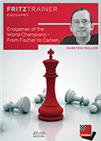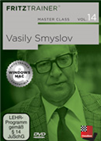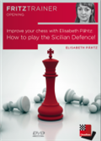Who will make it to the Candidates?
While the open section grants two spots in the Candidates Tournament, three women players will qualify to the all-important event in their category at the FIDE World Cups in Sochi. With Magnus Carlsen among the participants, potentially the match for third place will be as important in the open section as in the women’s event.
In order to reach what is the main objective for most players — qualifying to the Candidates — the participants in the open section need to win four matches in the next two weeks, while in the women’s category, getting three match victories will be enough to make it.
Let us explore some of the key factors to be considered looking forward in each section.
 Let endgame expert Dr Karsten Müller show and explain the finesses of the world champions. Although they had different styles each and every one of them played the endgame exceptionally well, so take the opportunity to enjoy and learn from some of the best endgames in the history of chess.
Let endgame expert Dr Karsten Müller show and explain the finesses of the world champions. Although they had different styles each and every one of them played the endgame exceptionally well, so take the opportunity to enjoy and learn from some of the best endgames in the history of chess.
Not so crowded anymore — the playing hall in Sochi | Photo: Anastasiia Korolkova
Open
Favourites
 Chess fans know how tough it is to win such a strong knockout event, which means it is even harder to talk about favourites. However, we cannot but acknowledge the fact that the rating favourite has had an optimal start in Sochi. World champion Magnus Carlsen does not need to play this tournament, but the ever-competitive Norwegian, who has dominated the elite circuit for over 10 years, has never won this tournament in his illustrious career, and that surely serves as great motivation to show his A-game in Sochi.
Chess fans know how tough it is to win such a strong knockout event, which means it is even harder to talk about favourites. However, we cannot but acknowledge the fact that the rating favourite has had an optimal start in Sochi. World champion Magnus Carlsen does not need to play this tournament, but the ever-competitive Norwegian, who has dominated the elite circuit for over 10 years, has never won this tournament in his illustrious career, and that surely serves as great motivation to show his A-game in Sochi.
Carlsen’s 4/4 start presages that he will win, at least, a couple more matches. It will not be easy, though. First, he will face the strong theoretician Radoslaw Wojtaszek; and if he advances to the round-of-16, he will face either Daniil Dubov or Andrey Esipenko, two young Russians who have beaten him in the recent past — Dubov at the Airthings Masters and Esipenko at the Tata Steel Masters.
We should also mention Maxime Vachier-Lagrave, Peter Svidler, Sergey Karjakin and Dmitry Andreikin as favourites based on their excellent results in previous World Cups.
[Carlsen’s photo: Anastasiia Korolkova]
The age factor
Recently, we looked back at the dramatic final of the World Cup’s 2015 edition, when Karjakin beat Svidler after losing the first two classical games. Svidler, who was almost 40 at the time, reached the final of the gruelling event — we might say — despite his age, but physical endurance was certainly a factor in the final match against his younger compatriot.
This year, a number of young players are still in contention, with Javokhir Sindarov and Praggnanandhaa (both 15 years old) the most extreme examples. While the two teenagers stand out for their incredibly young age, we should not forget to mention other junior players who not only have comparable stamina but also more experience than Sindarov and Pragg — i.e. Nodirbek Abdusattorov (16), Andrey Esipenko (19), Amin Tabatabaei (20), Jeffery Xiong (20), Haik Martirosyan (21) and Vladislav Artemiev (23).
So many Russians
 Smyslov cultivated a clear positional style and even in sharp tactical positions often relied more on his intuition than on concrete calculation of variations. Let our authors introduce you into the world of Vasily Smyslov.
Smyslov cultivated a clear positional style and even in sharp tactical positions often relied more on his intuition than on concrete calculation of variations. Let our authors introduce you into the world of Vasily Smyslov.The World Cup has been played as part of the World Chess Championship cycle since 2005. Out of the 8 editions that have taken place, 5 have been played in Khanty-Mansiysk, and 3 of them have seen an all-Russian final match — Svidler v Grishcuk in 2011, Kramnik v Andreikin in 2013 and Svidler v Karjakin in 2015.
This year, the tournament taking place in Sochi sees 10 out of the 32 players still in contention hailing from the host country. Not surprisingly, 3 of the round-4 matches will see Russians facing each other, which means that although we will not have 10 out of 16 Russians in the next stage, the minimum amount of local players in the round-of-16 is 3, with as many as 7 potentially reaching that stage.
The next most represented country is India, with 3 participants: Vidit, Harikrishna and Praggnanandhaa.

In good spirits — Andrey Esipenko | Photo: Anastasiia Korolkova
Women’s section
Fewer questions remain to be answered in the women’s tournament, mainly because half the number of players is still in contention. Moreover, ratings have served as an almost perfect predictor in this category, with only 3 players not from the top-16 making it into the round-of-16 — i.e. Elisabeth Paehtz, Valentina Gunina and Bibisara Assaubayeva.
While Gunina and Paehtz are household names in the women’s circuit, Assaubayeva’s performance has been the big surprise of the event. The 17-year-old will have a tough task in round 4, as she will face second seed Kateryna Lagno, who reached the final of the 2018 Women’s World Chess Championship (a similar knockout event), which she lost to Ju Wenjun.
Experience in similar tournaments might end up being crucial in the remaining stages of the tournament. We have already mentioned Lagno, but we should not forget the two players who have actually won analogous tournaments — Alexandra Kosteniuk and Mariya Muzychuk, who coincidentally are paired up against each other in round 4.
Much like in the open section, Russians are standing out in the women’s event, with 6 out of the 16 representatives from the host country playing in round 4. Besides Lagno, Kosteniuk and Gunina, Aleksandra Goryachkina, Alina Kashlinskaya and Polina Shuvalova have also made it to the round-of-16.
 The continuous stream of new ideas in the Sicilian makes 1..c5 the most popular answer to 1.e4. On this DVD I do give an introduction to the most important Sicilian systems.
The continuous stream of new ideas in the Sicilian makes 1..c5 the most popular answer to 1.e4. On this DVD I do give an introduction to the most important Sicilian systems.
Former women’s world champion Alexandra Kostniuk | Photo: Anastasiia Korolkova
Links
























